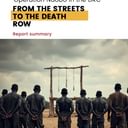
The Supreme Court of Kenya has declared the nation’s mandatory death sentencing procedures unconstitutional. In a December 14, 2017 ruling that could affect 7,000 death-row prisoners, the high court overturned Section 204 of Kenya’s Penal Code, which required that judges impose death sentences upon conviction of murder or armed robbery. The decision resolves conflicting rulings by the country’s lower courts of appeal, and grants new sentencing hearings to those currently sentenced to death.
Death-row prisoners Francis Karioko Muruatetu and Wilson Thirimbu Mwangi had challenged Kenya’s mandatory death penalty, arguing that compulsory imposition of the death penalty violated the independence of the judiciary by requiring judges to impose a sentence that was pre-determined by the legislature. According to Fred Ngatia, one of the pair’s lawyers, the practice “fouls the doctrine of separation of powers” by preventing judges from weighing mitigating factors. The defendants also argued that depriving judges of discretion over whether to impose a death sentence violated the right to a fair trial and constituted an arbitrary deprivation of life.
The court’s justices agreed and directed the Attorney-General, the Director of Public Prosecutions, and other government agencies to speedily review all capital cases of murder and armed robbery.
In 2010, Kenya’s Court of Appeal ruled in favor of death row prisoner Geoffrey Ngotho Mutiso, who had challenged the mandatory death sentence provision on the grounds that it denied judges the opportunity to consider mitigating circumstances that could spare a defendant’s life. Three years later, a different panel of the appeals court restored the controversial provision.
Oluwatosin Popoola, Amnesty International’s Adviser on the Death Penalty, said the Supreme Court’s ruling is a step towards abolishing the “cruel and inhumane” punishment. “It’s now time for the Kenyan authorities to take the required legal steps to abolish the death penalty fully and join the 105 countries that have completely consigned the punishment to history,” he said.
Kenya has not executed anyone since 1987 when Hezekiah Ochuka was convicted of treason and hanged for participating in an attempted coup. In 2009, President Mwai Kibaki commuted the sentences of more than 4,000 death prisoners to life. In 2016, President Uhuru Kenyatta commuted the death sentences of 2,747 death-row prisoners to life.
The Death Penalty Project, an international non-governmental organization that works to promote and protect the human rights of those facing the death penalty in British Commonwealth countries, Africa, Southeast Asia, and the Caribbean, has been litigating this issue in Kenya for more than a decade. Kenya is the thirteenth country in which it has successfully challenged mandatory death sentences. Parvais Jabbar, the Project’s Co-Executive Director called the court’s ruling a “momentous decision … [that] will have a huge impact,” even beyond the thousands of prisoners currently on Kenya’s death row. “[W]e hope it will also pave the way for further reform of the death penalty within Kenya and the Africa region more widely,” Jabbar said.
M. Kakah, Mandatory death sentence now unconstitutional in Kenya, Daily Nation, December 14 2017; Kenya: Landmark death penalty judgement must lead to full abolition of cruel punishment, Amnesty International, December 14, 2017; KENYAN SUPREME COURT DECLARES MANDATORY DEATH PENALTY UNCONSTITUTIONAL, The Death Penalty Project, December 14, 2017; S. Kiplagat, What Supreme Court ruling on death sentence means, Daily News, December 18, 2017.



